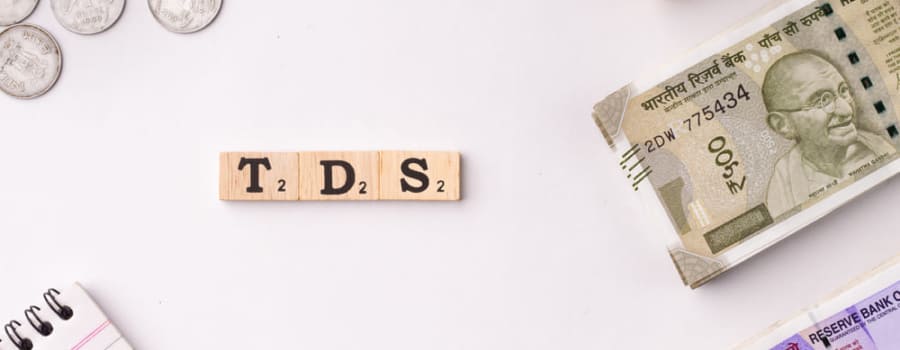Financial agreements deal with different types of TDS payments. And Section 194 of the Income Tax Act, 1961 details its tax* provisions for the benefit of the tenant and the owner. Two significant sub-sections, 194IA and I94B need detailed understanding when you get involved in a financial agreement. Here is a detail to help you out!
Before we understand Section 194IA and Section 194IB, it is important to understand the meaning of TDS.
What Is Meant By TDS?
Tax Deducted At Source (TDS) refers to deducting tax on a certain income received by a person. The remitter deducts it at the source and deposits it with the Income Tax Department. It can be reflected to the credit of the respective person while filing ITR.
What Is Section 194IA of the Income Tax Act, 1961?
Section 194IA of the Income Tax Act, 1961 states that the buyer of the immovable property costing more than ₹50 Lakh will have to deduct the TDS when settling the amount to the seller. The rate of TDS for this type of deduction is 1%.
Important pointers for consideration
While making TDS payments under Section 194IA, you need to consider the following pointers.
- TDS is only applicable for an immovable property costing more than ₹50 Lakh. And it has to be deducted by the buyer and not the seller.
- TDS has to be calculated based on the total cost of the property and not just on the amount exceeding ₹50 Lakh.
- If the payments are made in instalments, the TDS will be applicable on each instalment.
- Charges related to the immovable property, such as the car parking fees, maintenance fees, club membership fees, etc., are included with the immovable property's cost and become taxable.
- The buyer and the seller should have their PAN while making TDS payments. And, if the buyer does not obtain it, the TDS rate will increase to 20%.
Payment of TDS under Section 194IA

Here is a detail about how the TDS payments have to be made by the buyer.
- Form 26QB is required for the TDS payment.
- The buyer must make the TDS payment within 30 days from the month's last day when the buyer and seller organised the sale.
- After making the payment, the buyer has to receive Form 16B, which the buyer must give to the seller.
- The buyer can generate and download Form 16B for the TDS on purchase of property -online.
What Is Section 194IB of the Income Tax Act, 1961?
Section 194IB states that individuals and HUFs, not liable for audit under Section 44AB and not covered under Section 194I must deduct TDS for the rent paid to an Indian resident. However, the rent payment should be more than ₹50,000 per month for TDS under this Section.
Rent is any payment made for a lease, sub-lease, tenancy, or similar agreements for
- Land
- Building with factory
- Land with factory
- Furniture
- Fittings
- Machinery
- Equipment
- Plant
The rate for TDS here is stated as 5%. However, if the tenant doesn't obtain the PAN of the owner, the rate is increased to 20%.
Important pointers for consideration
Here are a few pointers to consider while making TDS payments on rent based on Section 194IB:
- The TDS amount should not exceed the amount of rent paid in the last month.
- If the rent amount does not exceed ₹50,000 per month, TDS is not required.
- If TDS is applicable under this Section, TAN is not required.
- The time for TDS is the first among:
- The time when the rent is received. And, it is for the previous year’s last month or the last month of the tenancy if the property is no longer occupied.
- The time of payment is made through cheque, cash, DD, or any other mode.
Payment of TDS under Section 194IB
Here is a detail about the TDS payments under this Section:
- Form 26QC is required to make the payments on TDS under Section 194IB.
- One can choose the online or offline mode through an authorised bank to pay the TDS.
- After making the payment, it is important to collect Form 16C to submit it to the owner.
- TDS has to be deposited on the same day if the rent is paid on behalf of the government. And, it has to be deposited within 7 days after the end of the month in which TDS is deducted. -.
- If the TDS payment is made in March, the amount must be deposited on or before April 30th.
Conclusion
Paying tax liability is an important financial commitment. To make the payments promptly, you must understand the different provisions stated under the Income Tax Act, 1961. Section 194IA and Section 194IB state important tax provisions for financial agreements. It deals with the TDS payments that the buyer should make while settling the amount to the seller or the owner. Be aware of the rate of TDS and the due date to make the TDS payments and deposit them to the Income Tax Department.
L&C/Advt/2022/Nov/2980









 FOR EXISTING POLICY
FOR EXISTING POLICY 
 FOR NEW POLICY
FOR NEW POLICY 






